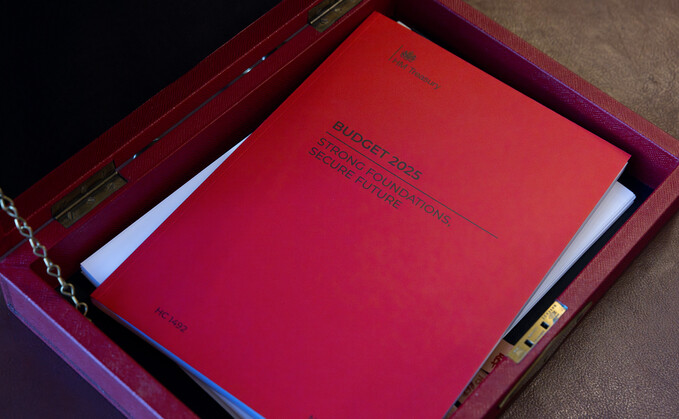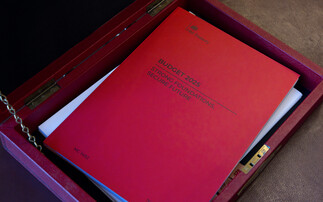
Picture by Kirsty O'Connor / Treasury
The Office for Budget Responsibility (OBR) has prematurely published its post-Budget economic forecast - revealing that the chancellor will limit the amount of someone’s salary that can be sacrificed through pension contributions without incurring national insurance (NI) payments.
The Office for Budget Responsibility (OBR) has prematurely published its post-Budget economic forecast - revealing that the chancellor will limit the amount of someone's salary that can be sacrificed through pension contributions without incurring national insurance (NI) payments.
The OBR report sets out the main tax-raising measures in the Budget - forecasting that charging National Insurance on salary-sacrificed pension contributions will raise an additional £4.7bn for the Treasury.
Chancellor Rachel Reeves is set to set out her Budget measures formally at 12:30pm today.
The OBR report said salary-sacrificed pension contributions above an annual £2,000 threshold will no longer be exempt from NI contributions (NICs) from April 2029.
It said this means that salary-sacrificed pension contributions above £2,000 will be treated as ordinary employee pension contributions in the tax system and therefore be subject to both employer and employee NICs. The OBR said ordinary employer pension contributions will remain exempt from NICs.
The OBR said the policy results in an increase in NICs which is estimated to raise £4.7bn in 2029-30 and £2.6bn in 2030-31.
The OBR said the costing assumes that in most cases employee pension contributions above £2,000 that were part of a salary-sacrifice scheme will become subject to employer and employee NICs - either because they move to a standard pension scheme or continue in a salary-sacrifice scheme under the new tax arrangements.
It said the estimated yield from this measure is subject to uncertainties related to potential responses to the change by employers and employees.
Despite this, the OBR said employers could look to replicate the tax benefits of salary-sacrifice by reducing future wage growth and instead providing employees with higher employer pension contributions. It would also be possible to formally replicate salary-sacrifice through an agreement to reduce wages and increase employer pensions contributions. It said, however, this behaviour would be constrained by interactions with Operational Remuneration Agreement (OpRA) rules and employment law meaning that such reductions would need to be agreed with the entire workforce, so it said this is unlikely to be a widespread response. Overall, it estimated these responses could reduce the yield by £0.7bn by 2030-31.
Employees switching to RAS schemes
The OBR said its costing assumes many employees will switch to making ordinary pension contributions, some of which will be to relief at source (RAS) schemes. Where an employee contributes to a RAS scheme, they will initially pay higher- and additional-rate income tax on their pension contributions, and then reclaim this through their self-assessment return in the next year.
The OBR said this creates a temporary timing effect as employees switching from salary-sacrifice to RAS in 2029-30 pay increased tax in that year, and then reclaim it in 2030-31, boosting 2029-30 receipts by £1.6bn. Beyond the forecast period, it said this effect becomes small.
Pre-Budget speculation
The move will follow weeks of speculation around the Budget – with The Times and Financial Times reporting earlier this month that the chancellor would target salary sacrifice arrangements in a bid to help fill a gap in public finances.
At present there is no limit on the amount that an employee can put into their pension under salary sacrifice schemes before it becomes subject to NI. The cap will mean that any pension contributions over the £2,000 level would result in an employee paying the full rate of NI of 8% on a salary of less than £50,000 and 2% on income above that.
The move has been strongly resisted by the pensions sector ahead of the Budget – with Pensions UK saying a move to limit salary sacrifice would "hit working people" and result in "less money flowing into pensions".
Commenting last week, Pensions UK executive director of policy Zoe Alexander said: "Any change to salary sacrifice would inject uncertainty into a system that needs long-term trust, not sudden shocks. It would add operational pressure for employers and risk undermining the retirement prospects of working people across the country."
She added: "Introducing a cap would weaken incentives to save when we are facing a generation retiring with inadequate retirement savings."
The Association of British Insurers (ABI) said research it had conducted with Opinium Research showed two in five (38%) or Britons would save less into their pension if a salary sacrifice scheme cap was implemented.
Separate research conducted by the ABI in association with Reward and Employee Benefits Association (REBA) found that, if the government were to introduce a £2,000 threshold on salary sacrifice for pension contributions, some 31% of businesses would reduce their contributions to an employee's pension, and 45% would reduce other employee benefits and services.
Commenting ahead of the Budget, ABI director of policy and long-term savings Yvonne Braun said: "These types of short-term revenue raisers put the long-term security of people's futures at risk."















